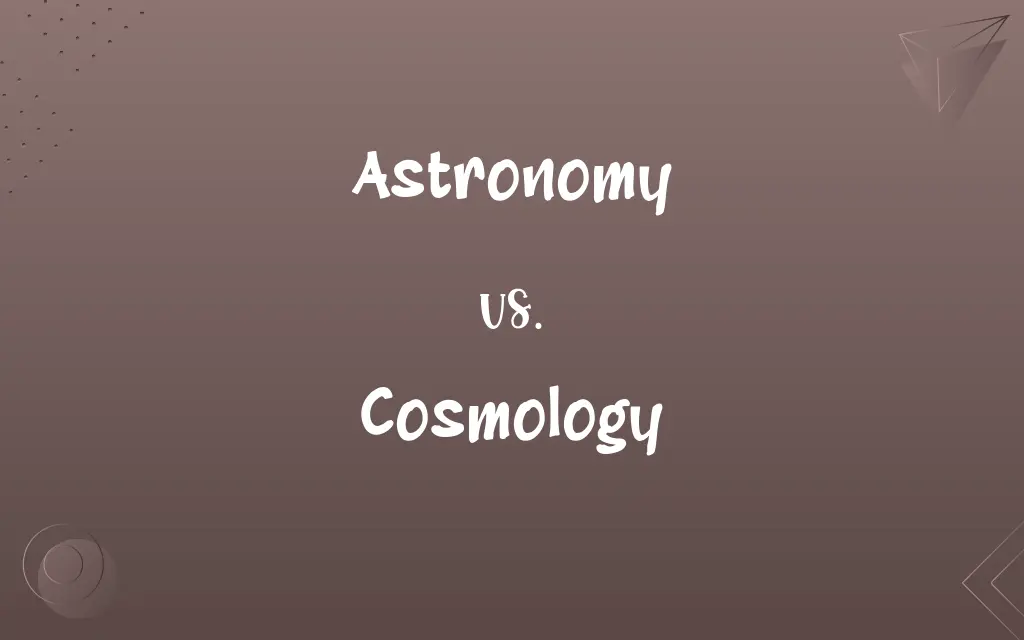Astronomy vs. Cosmology: Know the Difference

By Shumaila Saeed || Updated on December 25, 2023
Astronomy is the scientific study of celestial objects and phenomena, while Cosmology focuses on the origin, evolution, and ultimate fate of the universe as a whole.

Key Differences
Astronomy involves the detailed study of stars, planets, galaxies, and other celestial bodies, focusing on their properties, behavior, and interactions. Cosmology, however, delves into the larger scale of the universe, exploring its origin, structure, dynamics, and eventual fate.
Shumaila Saeed
Dec 18, 2023
Astronomers use telescopes and other observational tools to gather data about celestial objects. In contrast, Cosmologists often employ theoretical models and mathematical frameworks alongside observational data to understand the universe's evolution and large-scale structure.
Shumaila Saeed
Dec 18, 2023
Astronomy, one of the oldest sciences, has evolved from simple celestial observations to complex explorations of cosmic phenomena. Cosmology, while benefiting from astronomical discoveries, has developed as a distinct field focusing on theoretical and philosophical questions about the universe.
Shumaila Saeed
Dec 18, 2023
Astronomy examines questions like the life cycle of stars, the nature of black holes, and the structure of galaxies. Cosmology addresses broader questions such as the Big Bang, the nature of dark matter and dark energy, and the shape and fate of the universe.
Shumaila Saeed
Dec 18, 2023
Astronomy intersects with physics, geology, and meteorology in studying celestial bodies and phenomena. Cosmology, while rooted in astronomy, extends into areas of high-energy physics, quantum theory, and philosophy in its quest to understand the universe.
Shumaila Saeed
Dec 18, 2023
ADVERTISEMENT
Comparison Chart
Primary Focus
Study of celestial objects and phenomena.
Study of the universe's origin, structure, fate.
Shumaila Saeed
Dec 18, 2023
Tools and Techniques
Telescopes, spectroscopy, astrophotography.
Theoretical models, cosmic microwave background.
Shumaila Saeed
Dec 18, 2023
Key Questions
How do stars form and evolve? What are black holes?
What caused the Big Bang? Nature of dark matter?
Shumaila Saeed
Dec 18, 2023
Historical Roots
Ancient observational practices.
Philosophical and theoretical origins.
Shumaila Saeed
Dec 18, 2023
Relationship to Physics
Applies physics to understand celestial bodies.
Explores fundamental physics of the universe.
Shumaila Saeed
Dec 18, 2023
ADVERTISEMENT
Astronomy and Cosmology Definitions
Astronomy
The scientific study of celestial objects and space phenomena.
Through astronomy, we have discovered countless stars and galaxies.
Shumaila Saeed
Dec 12, 2023
Cosmology
An exploration of the large-scale properties of the universe.
Through cosmology, we understand the universe is expanding.
Shumaila Saeed
Dec 12, 2023
Astronomy
An observational and theoretical science of celestial bodies.
Astronomy has been instrumental in understanding the solar system's dynamics.
Shumaila Saeed
Dec 12, 2023
Cosmology
A branch of astronomy focused on the universe as a whole.
Cosmology addresses questions about the universe's overall structure.
Shumaila Saeed
Dec 12, 2023
Astronomy
The study of the movements and positions of stars and planets.
Ancient navigation techniques were heavily reliant on astronomy.
Shumaila Saeed
Dec 12, 2023
ADVERTISEMENT
Cosmology
The scientific study of the universe's origin, evolution, and fate.
Cosmology seeks to unravel the mysteries of the Big Bang.
Shumaila Saeed
Dec 12, 2023
Astronomy
A field focusing on the physical properties of cosmic objects.
Astronomy helps us comprehend the composition of distant planets.
Shumaila Saeed
Dec 12, 2023
Cosmology
The study of the physical universe considered as a totality of phenomena in time and space.
Shumaila Saeed
Dec 08, 2023
Astronomy
The scientific study of matter and phenomena in the universe, especially in outer space, including the positions, dimensions, distribution, motion, composition, energy, and evolution of celestial objects.
Shumaila Saeed
Dec 08, 2023
Cosmology
The astrophysical study of the history, structure, and constituent dynamics of the universe.
Shumaila Saeed
Dec 08, 2023
Astronomy
A system of knowledge or beliefs about celestial phenomena
The various astronomies of ancient civilizations.
Shumaila Saeed
Dec 08, 2023
Astronomy
The study of the physical universe beyond the Earth's atmosphere, including the process of mapping locations and properties of the matter and radiation in the universe.
Shumaila Saeed
Dec 08, 2023
Cosmology
A philosophical, religious, or mythical explanation of the nature and structure of the universe.
Shumaila Saeed
Dec 08, 2023
Cosmology
The study of the physical universe, its structure, dynamics, origin and evolution, and fate.
Shumaila Saeed
Dec 08, 2023
Astronomy
Astrology.
Not from the stars do I my judgment pluck;And yet methinks I have astronomy.
Shumaila Saeed
Dec 08, 2023
Astronomy
The science which treats of the celestial bodies, of their magnitudes, motions, distances, periods of revolution, eclipses, constitution, physical condition, and of the causes of their various phenomena.
Shumaila Saeed
Dec 08, 2023
Cosmology
A particular view (cultural or religious) of the structure and origin of the universe.
Shumaila Saeed
Dec 08, 2023
Cosmology
The branch of science or philosophy dealing with the origin and nature of the universe as a whole.
Shumaila Saeed
Dec 08, 2023
Astronomy
The branch of physics that studies celestial bodies and the universe as a whole
Shumaila Saeed
Dec 08, 2023
Cosmology
A treatise dealing with the original and structure of the universe.
Shumaila Saeed
Dec 08, 2023
Astronomy
The exploration of the universe beyond Earth's atmosphere.
Astronomy has revealed much about the Milky Way's structure.
Shumaila Saeed
Dec 12, 2023
Cosmology
The branch of astrophysics that studies the origin and evolution and structure of the universe
Shumaila Saeed
Dec 08, 2023
Cosmology
The study of cosmic phenomena at the grandest scales.
Cosmology involves researching dark matter and dark energy.
Shumaila Saeed
Dec 12, 2023
Cosmology
The investigation of fundamental questions about the universe.
Cosmology probes into the nature and future of the cosmos.
Shumaila Saeed
Dec 12, 2023
Repeatedly Asked Queries
How do Astronomy and Cosmology differ in tools?
Astronomy uses telescopes; Cosmology combines observational data with theoretical models.
Shumaila Saeed
Dec 18, 2023
What is Astronomy?
Astronomy is the study of celestial bodies and phenomena in space.
Shumaila Saeed
Dec 18, 2023
What does Cosmology focus on?
Cosmology focuses on the universe's origin, structure, and ultimate fate.
Shumaila Saeed
Dec 18, 2023
What do Astronomers study?
Astronomers study stars, planets, galaxies, and other celestial objects.
Shumaila Saeed
Dec 18, 2023
Is Cosmology a part of Astronomy?
Cosmology is a branch of Astronomy focused on the universe as a whole.
Shumaila Saeed
Dec 18, 2023
Do Astronomers observe black holes?
Yes, Astronomers study black holes and their effects on surrounding space.
Shumaila Saeed
Dec 18, 2023
How does Cosmology contribute to science?
Cosmology contributes by providing insights into the universe's evolution and laws.
Shumaila Saeed
Dec 18, 2023
Are Astronomy and Cosmology related?
Yes, they are related but focus on different scales and questions.
Shumaila Saeed
Dec 18, 2023
Can Astronomy explain the Big Bang?
Astronomy contributes to the understanding, but Cosmology specifically studies the Big Bang.
Shumaila Saeed
Dec 18, 2023
What role does physics play in Cosmology?
Physics is crucial in Cosmology for understanding the universe's fundamental nature.
Shumaila Saeed
Dec 18, 2023
What is the ultimate goal of Cosmology?
The goal of Cosmology is to understand the universe's overall history and future.
Shumaila Saeed
Dec 18, 2023
How old is the field of Astronomy?
Astronomy is one of the oldest sciences, dating back to ancient civilizations.
Shumaila Saeed
Dec 18, 2023
Are there different branches of Astronomy?
Yes, including planetary science, stellar astronomy, and galactic astronomy.
Shumaila Saeed
Dec 18, 2023
What questions does Cosmology seek to answer?
Cosmology seeks to answer questions about the universe's origin, content, and fate.
Shumaila Saeed
Dec 18, 2023
Does Cosmology involve theoretical physics?
Yes, Cosmology heavily involves theoretical physics to explain cosmic phenomena.
Shumaila Saeed
Dec 18, 2023
How do Astronomers gather data?
Astronomers gather data through telescopic observations and space missions.
Shumaila Saeed
Dec 18, 2023
What technologies are used in Astronomy?
Telescopes, satellites, and spectrographs are commonly used in Astronomy.
Shumaila Saeed
Dec 18, 2023
Does Cosmology study dark matter?
Yes, Cosmology studies dark matter and its influence on the universe's structure.
Shumaila Saeed
Dec 18, 2023
Can Astronomy predict celestial events?
Yes, Astronomy can predict events like eclipses, comet appearances, and planetary alignments.
Shumaila Saeed
Dec 18, 2023
Is the study of exoplanets a part of Astronomy?
Yes, the study of exoplanets falls under the domain of Astronomy.
Shumaila Saeed
Dec 18, 2023
Share this page
Link for your blog / website
HTML
Link to share via messenger
About Author
Written by
Shumaila SaeedShumaila Saeed, an expert content creator with 6 years of experience, specializes in distilling complex topics into easily digestible comparisons, shining a light on the nuances that both inform and educate readers with clarity and accuracy.









































































